- Учителю
- Методическая разработка для проведения викторины посвящённой Уильяму Шекспиру на уроках английского языка
Методическая разработка для проведения викторины посвящённой Уильяму Шекспиру на уроках английского языка
Методическая разработка
Организация викторины по творчеству Уильяма Шекспира на уроках иностранного языка в школе
МАОУ ООШ №20 г.Губаха
Выполнила: учитель иностранного языка Гиниятова Ирина Александровна
Аннотация
Для активизации творческих способностей учащихся необходимо совершенствовать виды и формы учебной деятельности и внеклассной работы ( предметные недели, конкурсы, викторины, игры, КВН, праздники, часы веселых соревнований). Это позволит закрепить пройденный материал на уровне образного мышления.
Данное мероприятие посвящено проблеме повышения интереса к обучению иностранных языков в школе.
Введение
Викторина приурочена к 400-летнему юбилею смерти классика английской драматургии, знатока истории и исследователя человеческой души, пронзительного лирика и мудрого философа Уильяма Шекспира. Созданные три с лишним века назад произведения Шекспира живут до сих пор, волнуют и потрясают воображение зрителей. Лучшие театры мира и выдающиеся актеры поныне считают для себя экзаменом и счастьем поставить и сыграть шекспировский спектакль. Уильям Шекспир написал 10 трагедий, но наиболее известной является «Трагедия Ромео и Джульетты». «Нет повести печальнее на свете, чем повесть о Ромео и Джульетте»
Проведению викторины предшествует ознакомление с жизнью и творчеством Уильяма Шекспира на оформленной в школе выставке и презентация.
Заключение.
Опыт проведения викторины в школе показывает, что общая непринужденная психологически подготовленная атмосфера в школе способствует проявлению индивидуальных возможностей всех ребят с различными уровнями обученности, способствует расширению и обогащению приобретенного учебного, языкового и речевого опыта в курсе овладения иностранного языка, повышает престиж изучения иностранного языка.
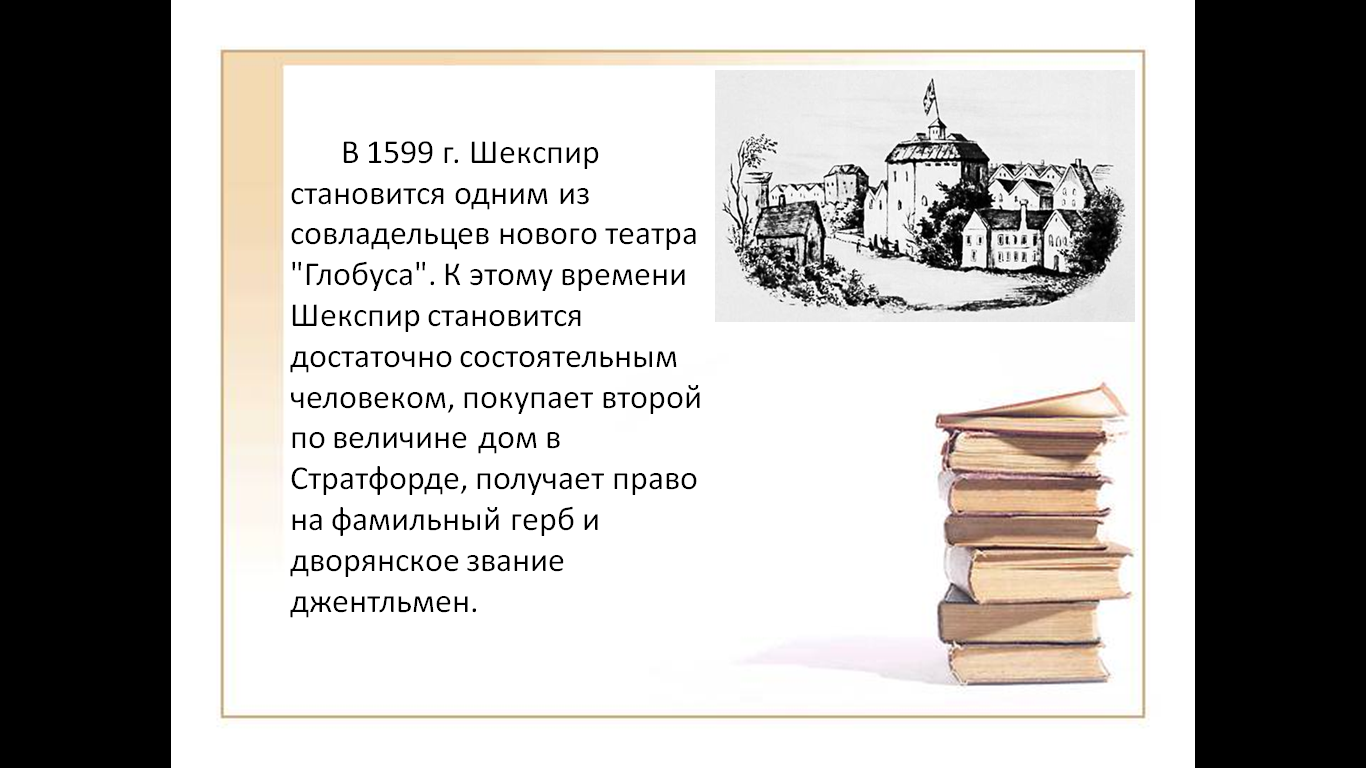
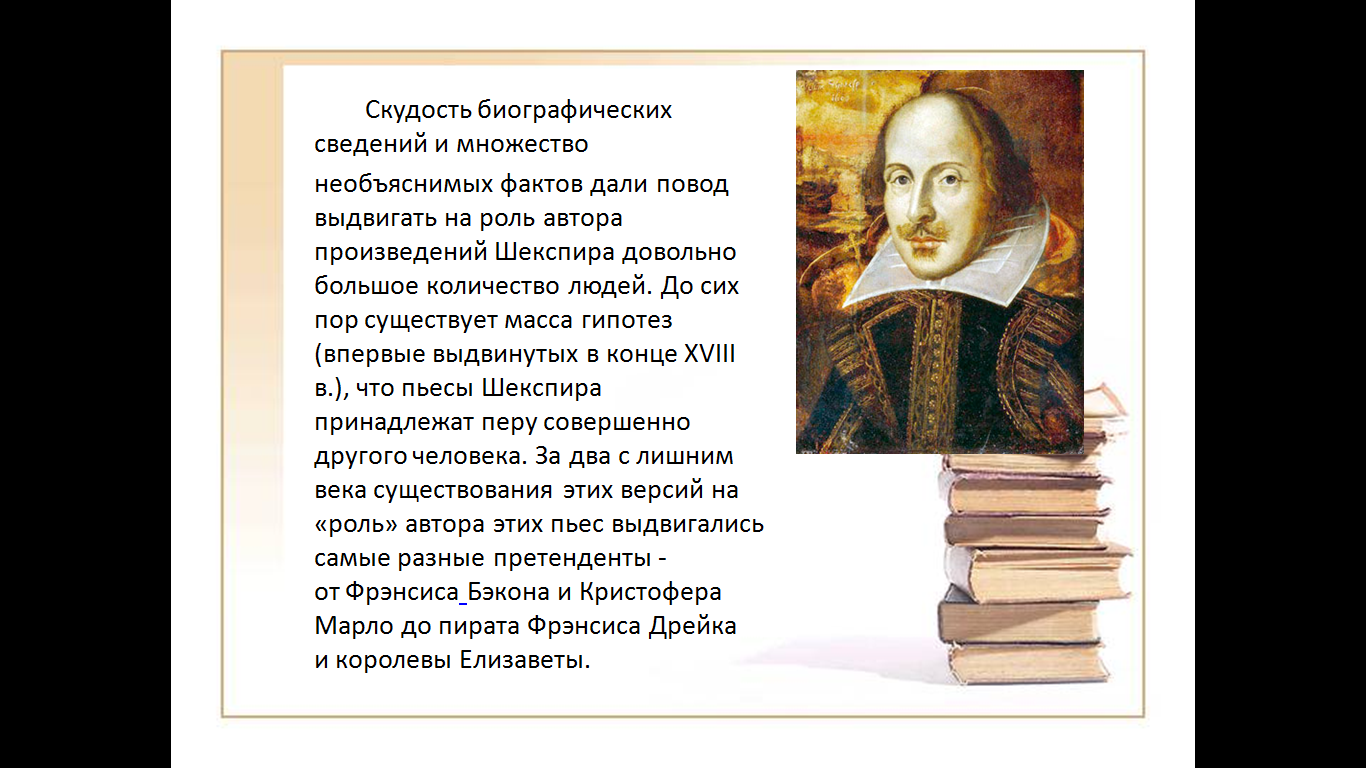
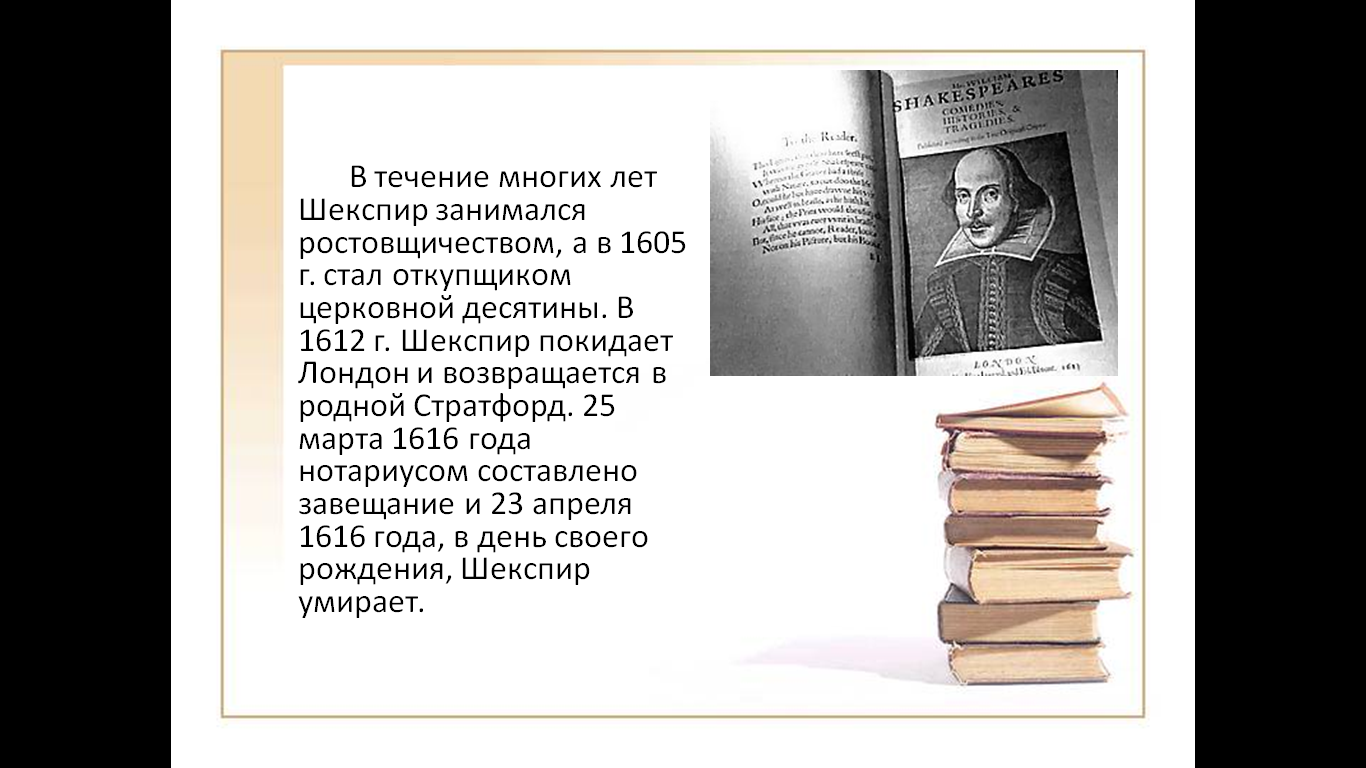
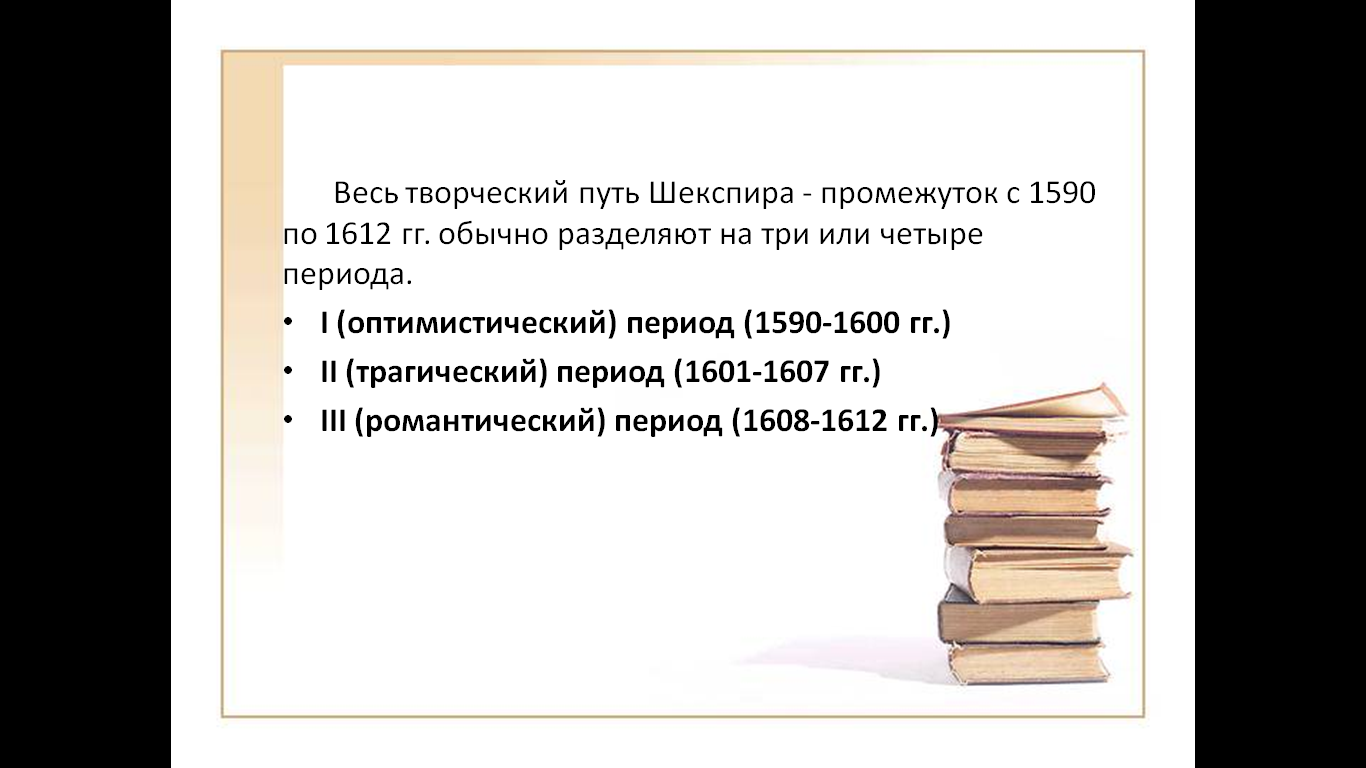
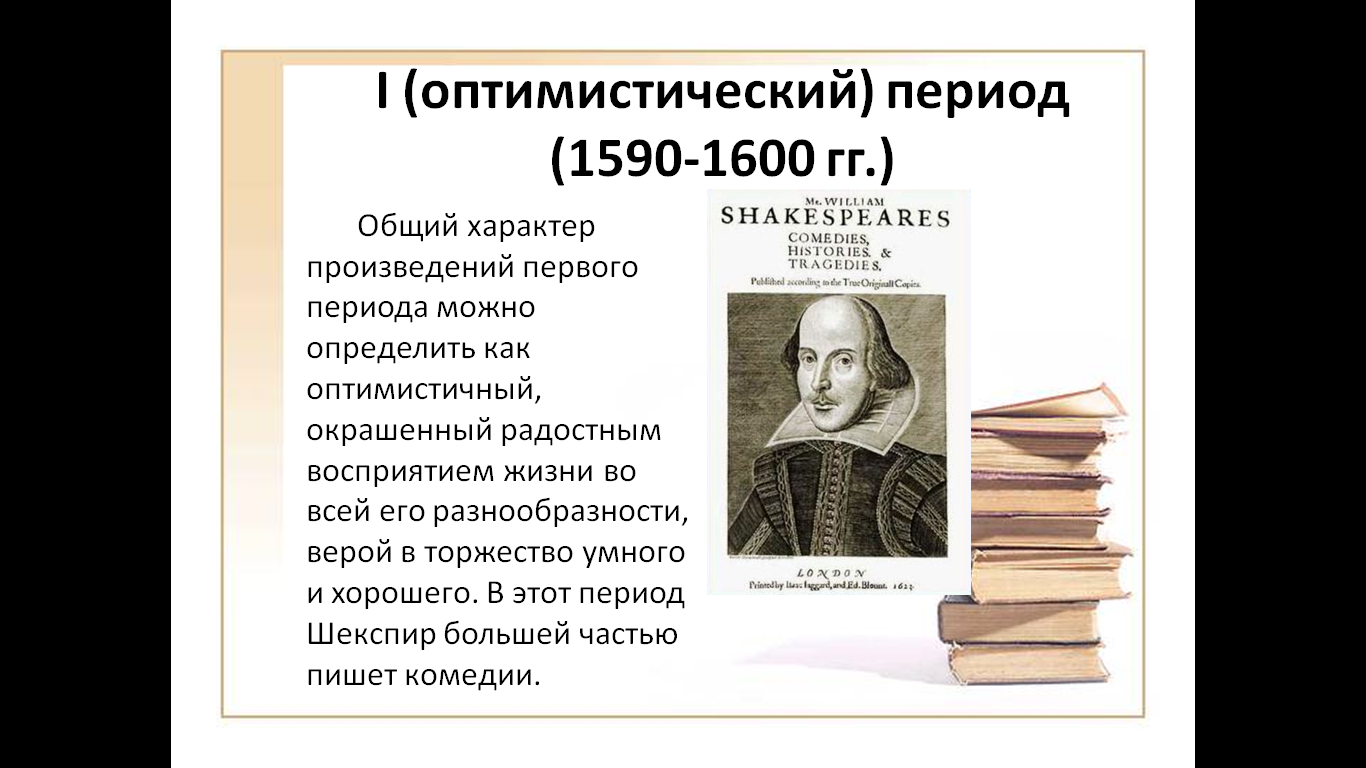
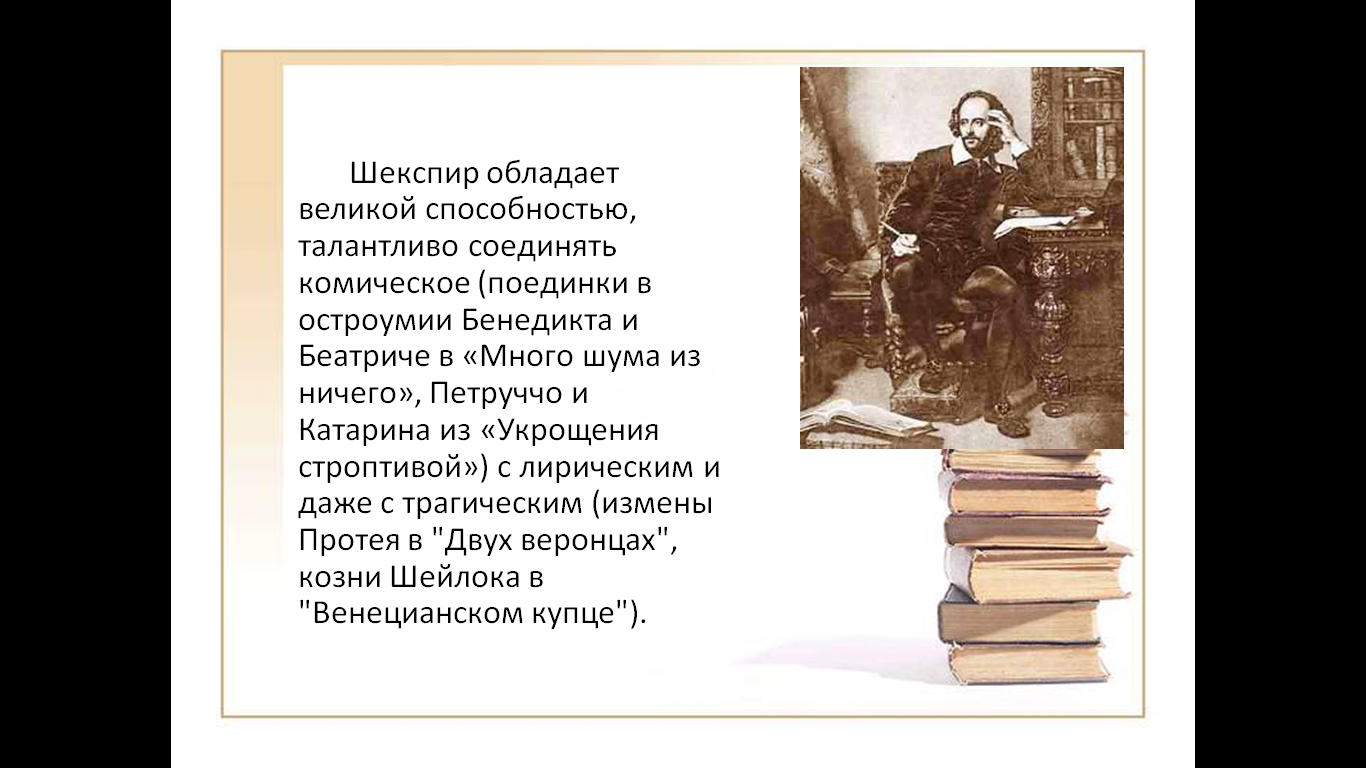
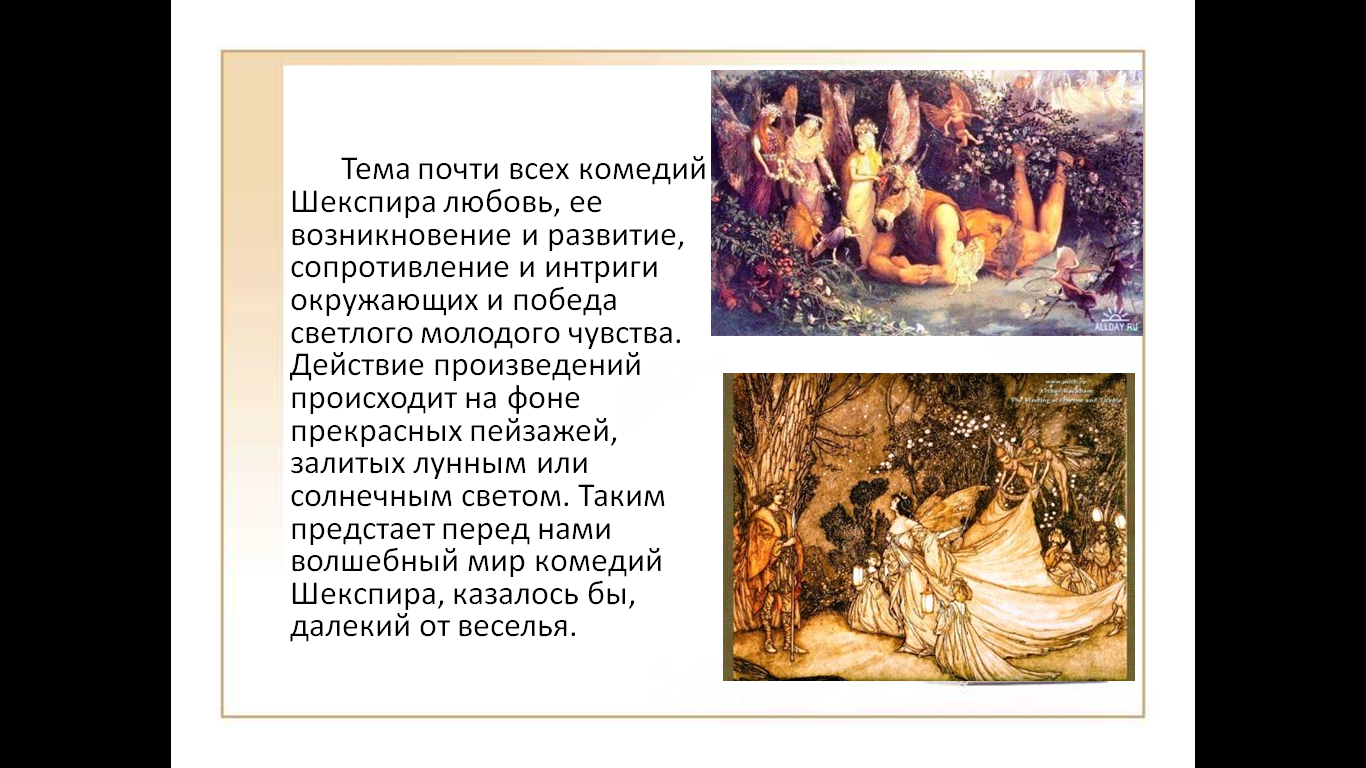
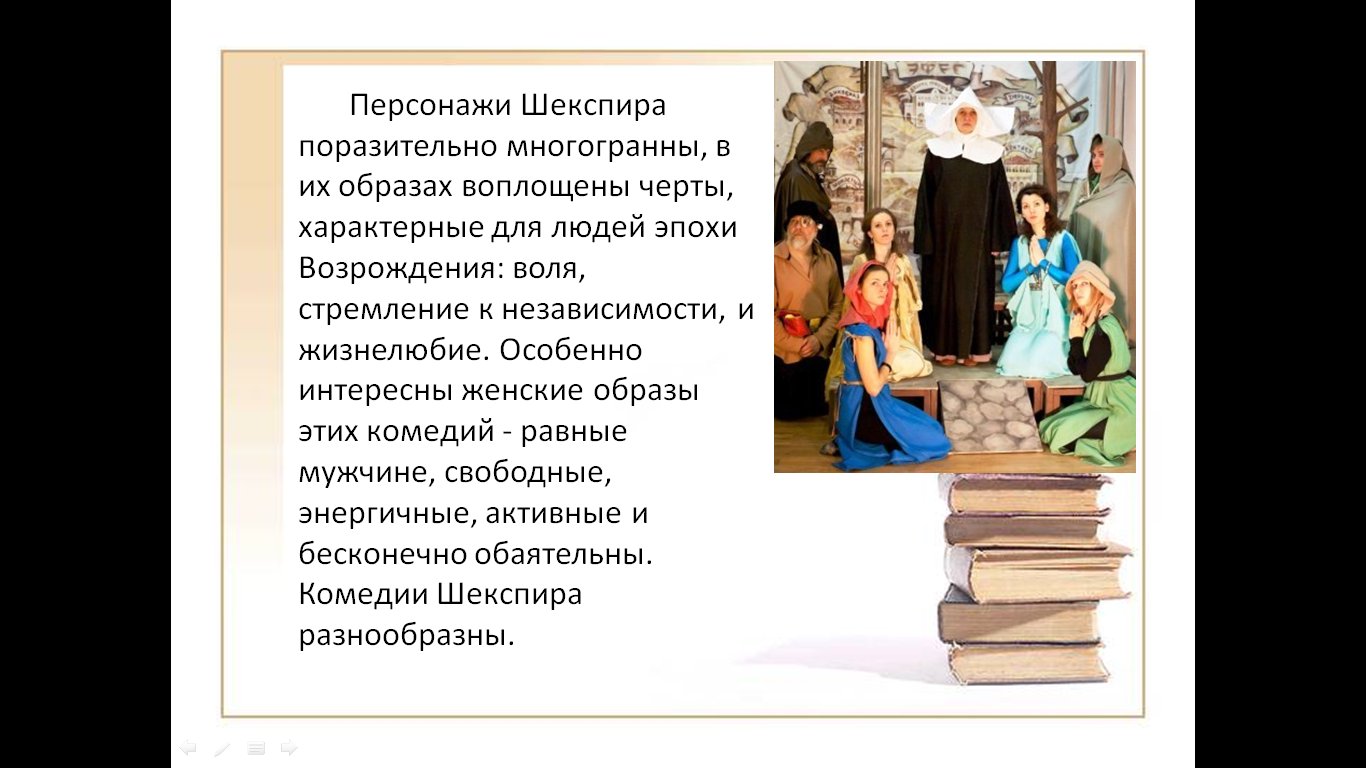
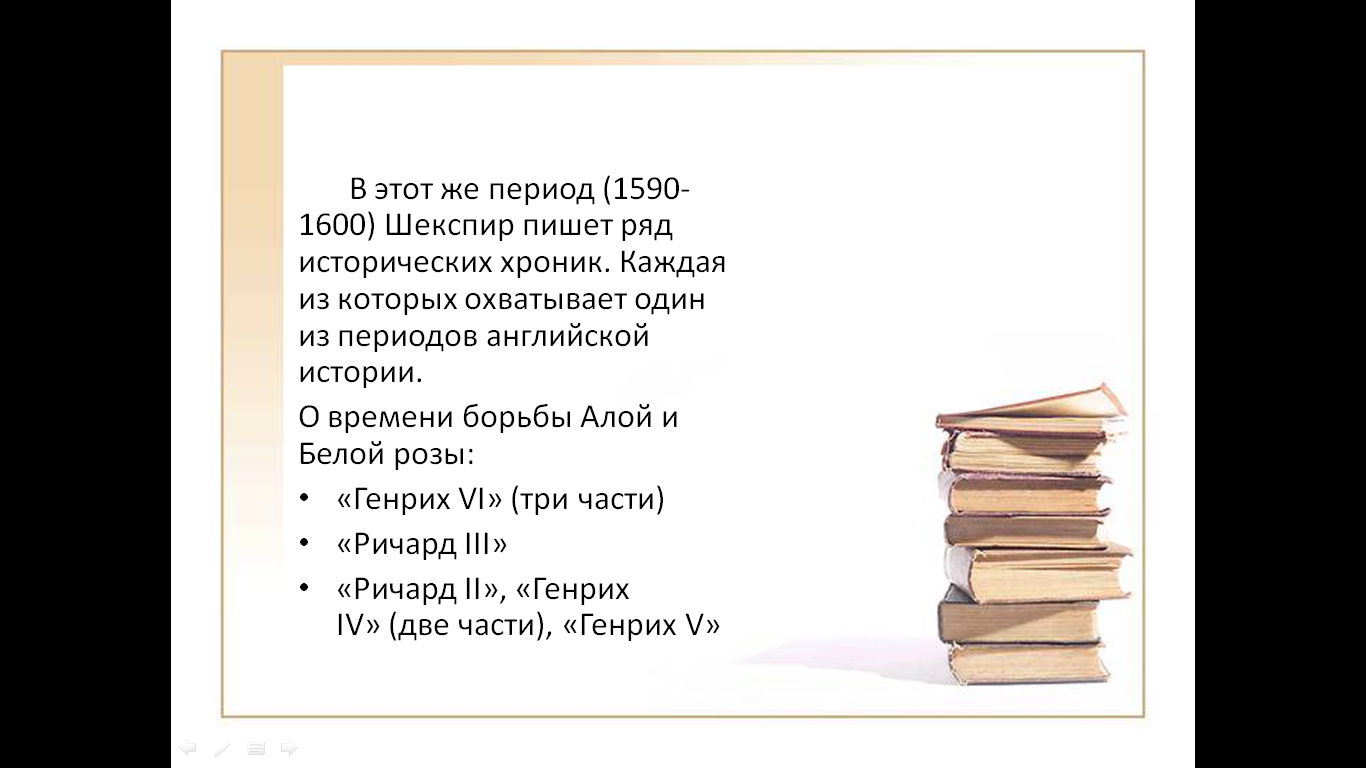
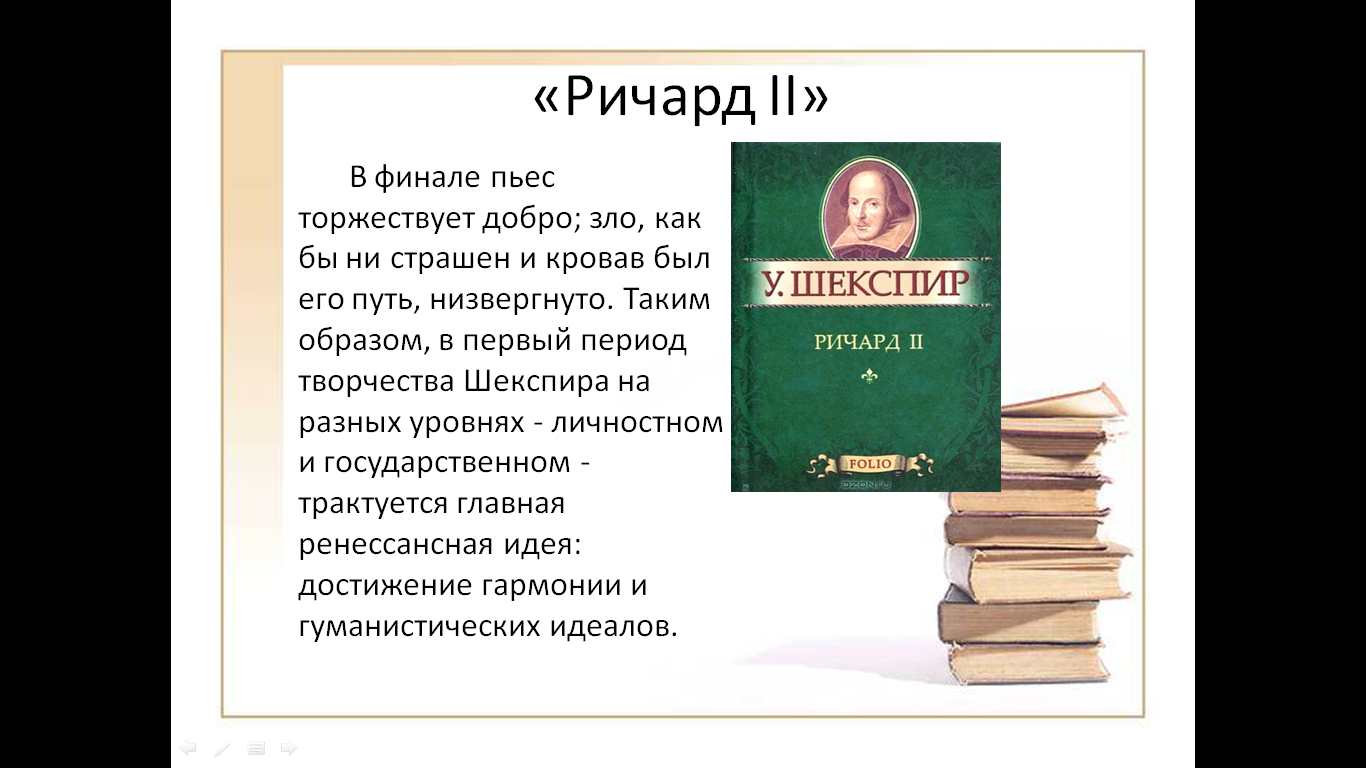
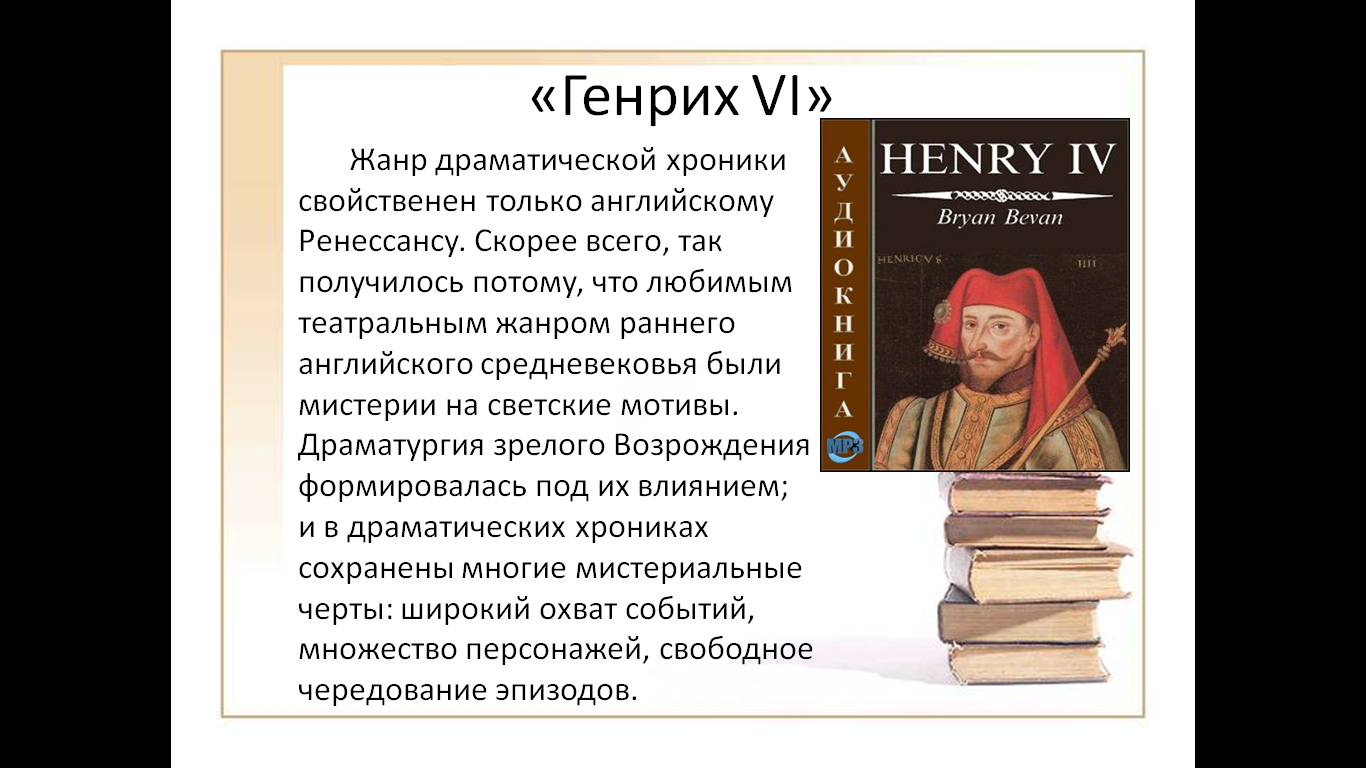
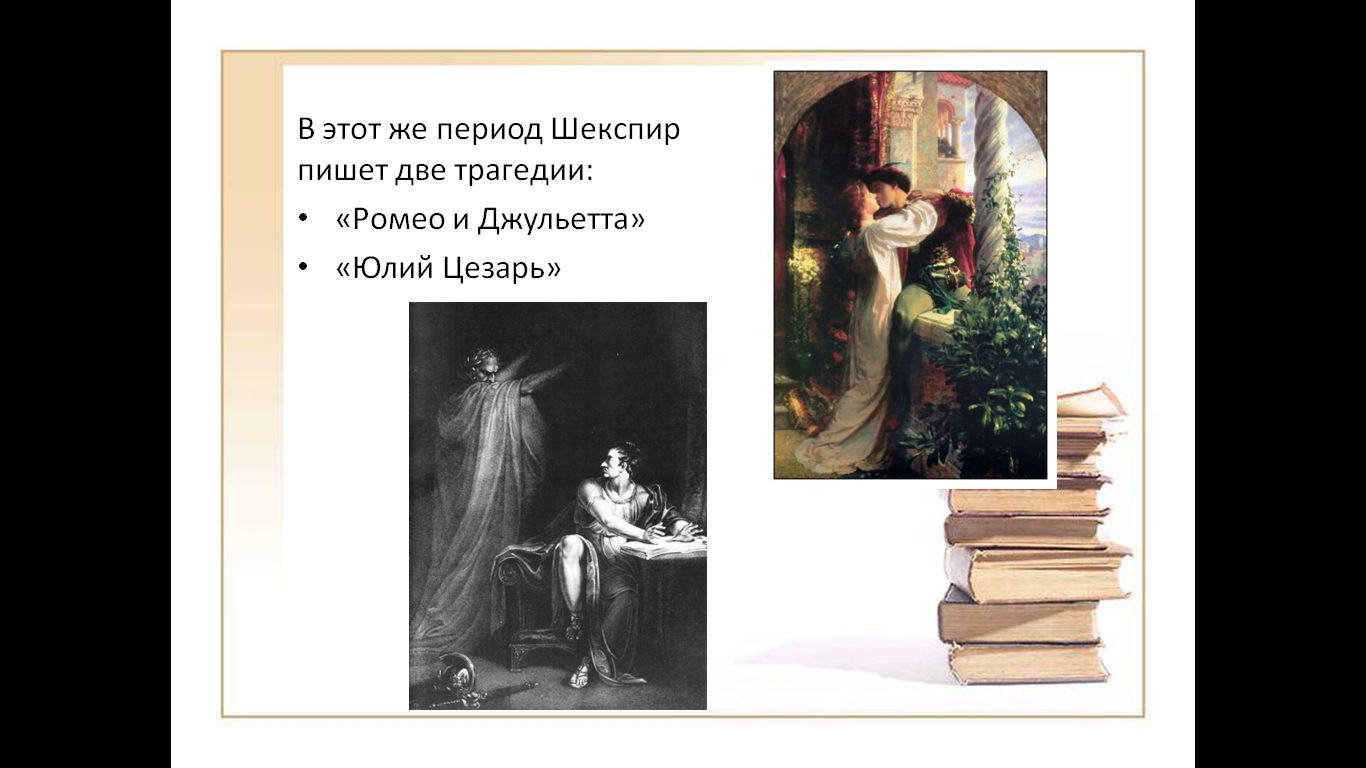
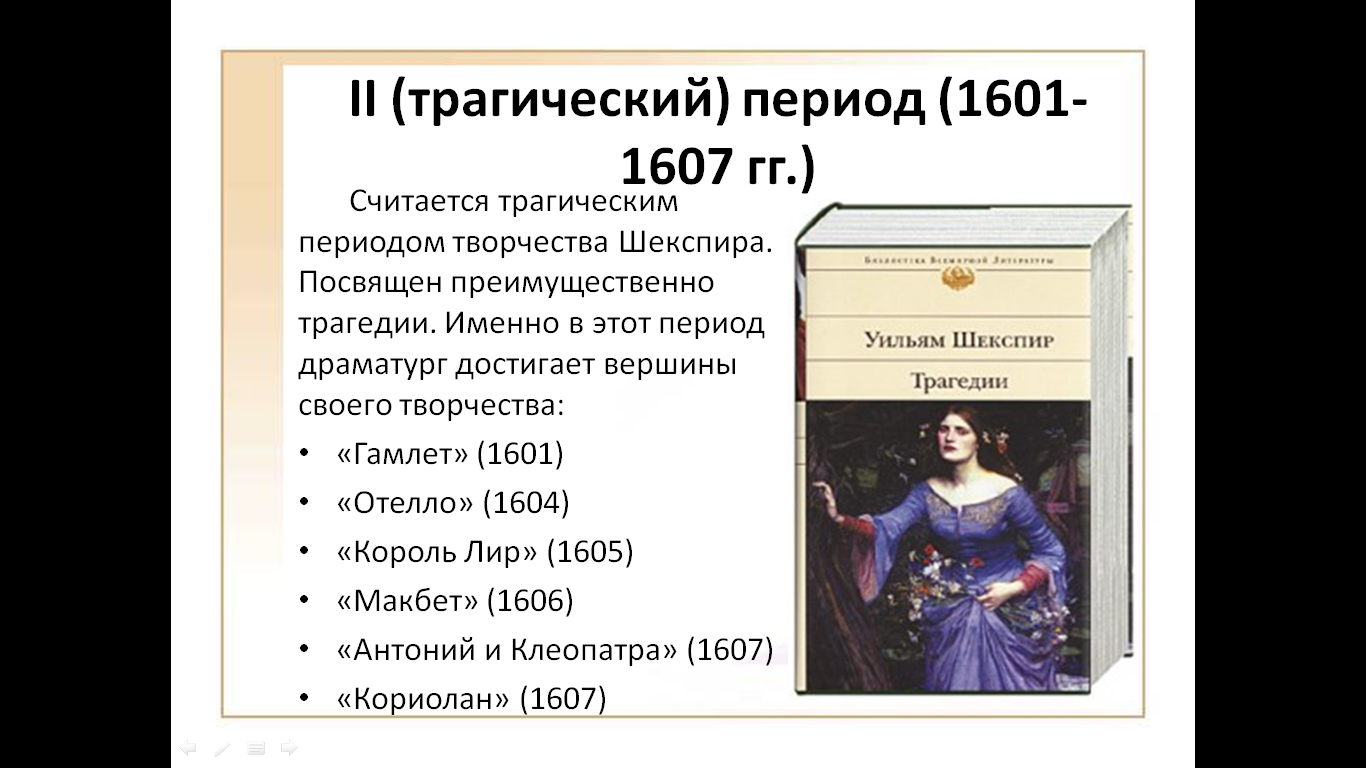
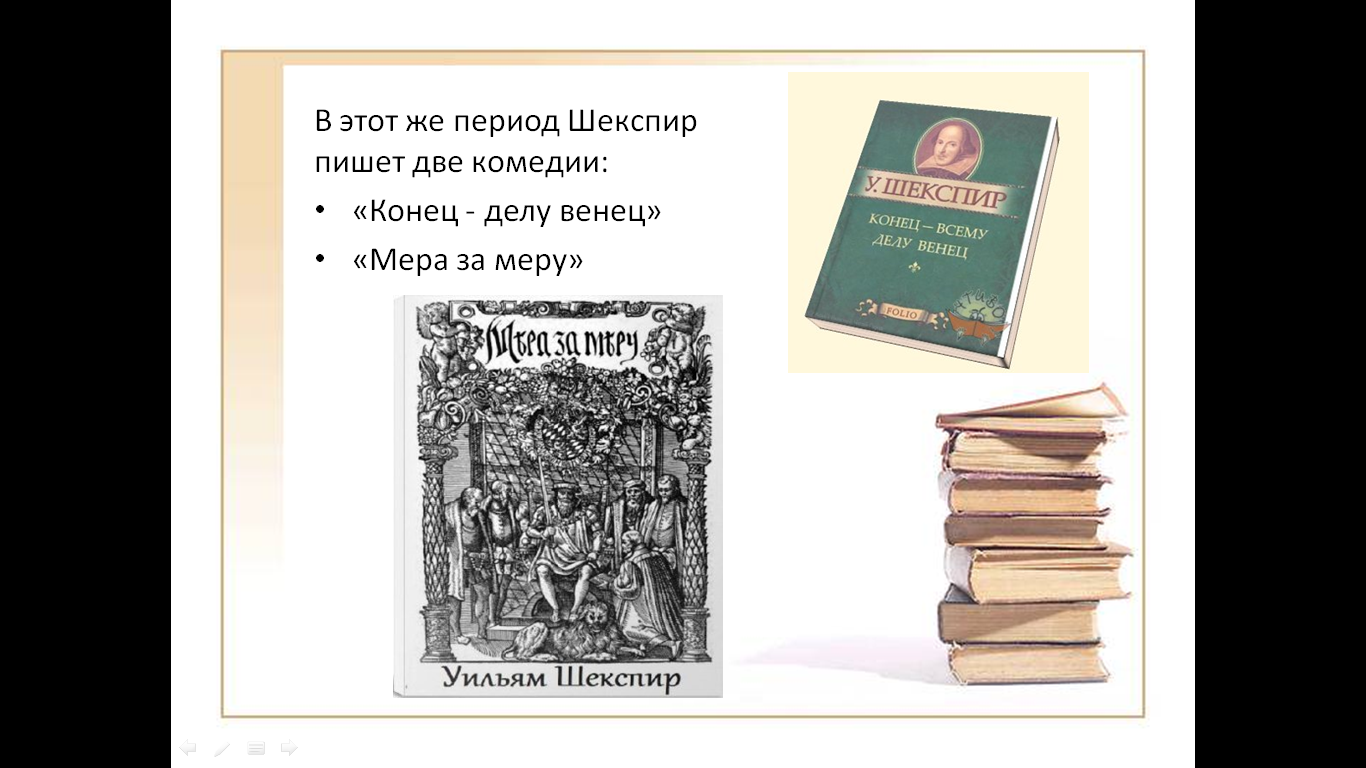
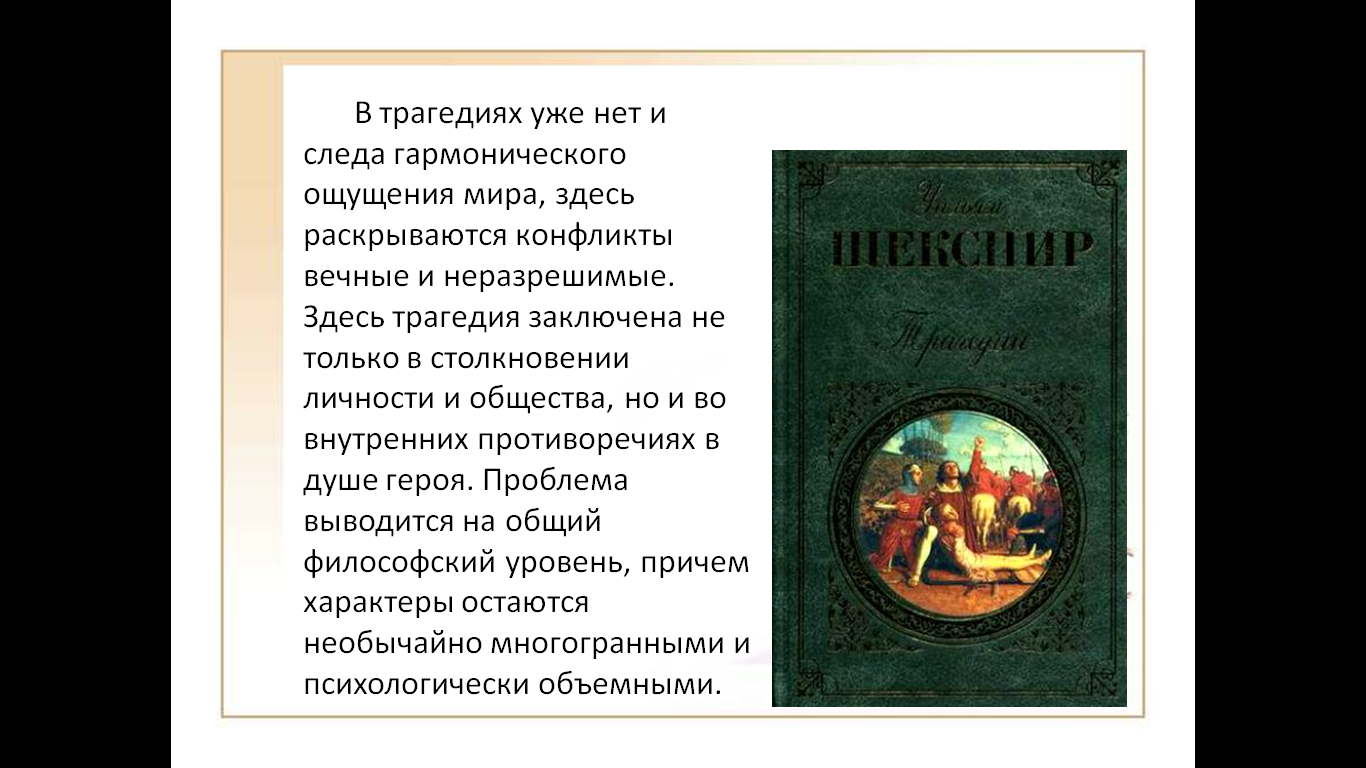
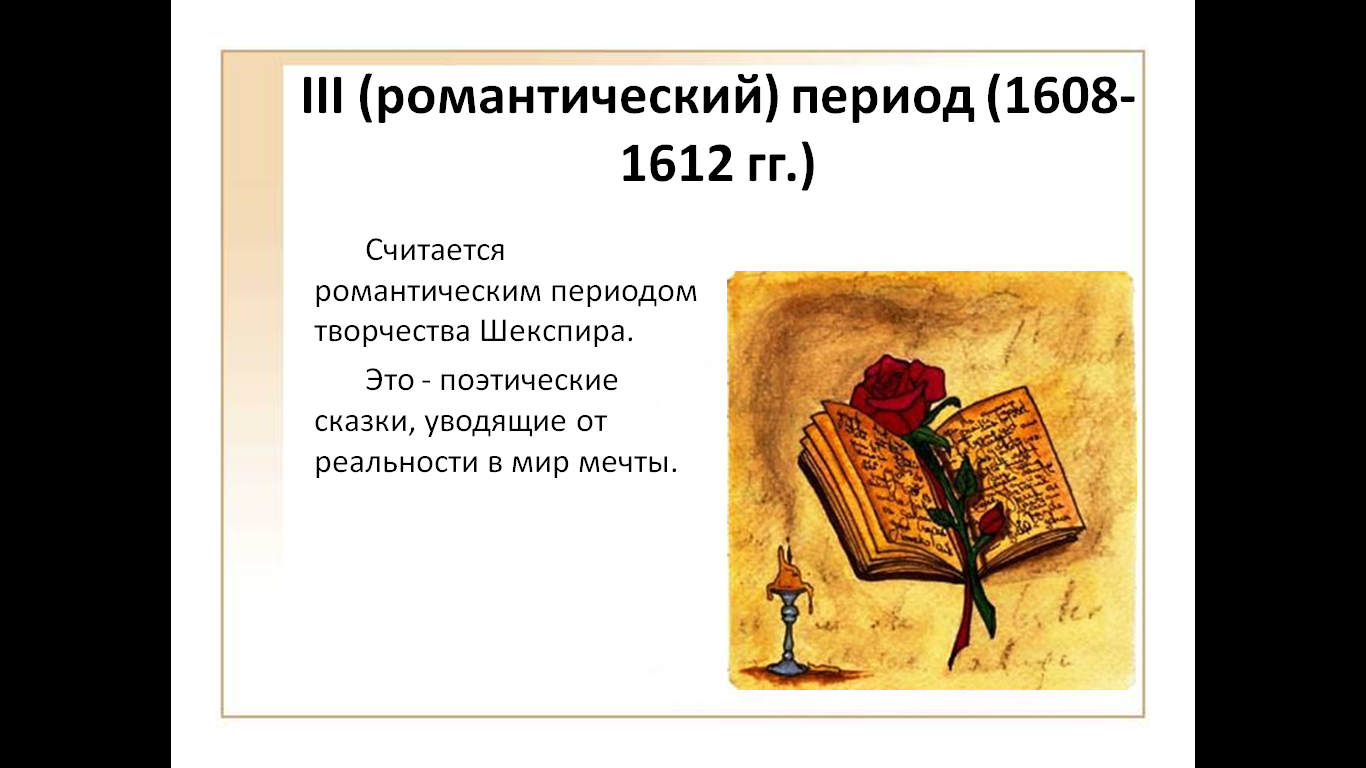
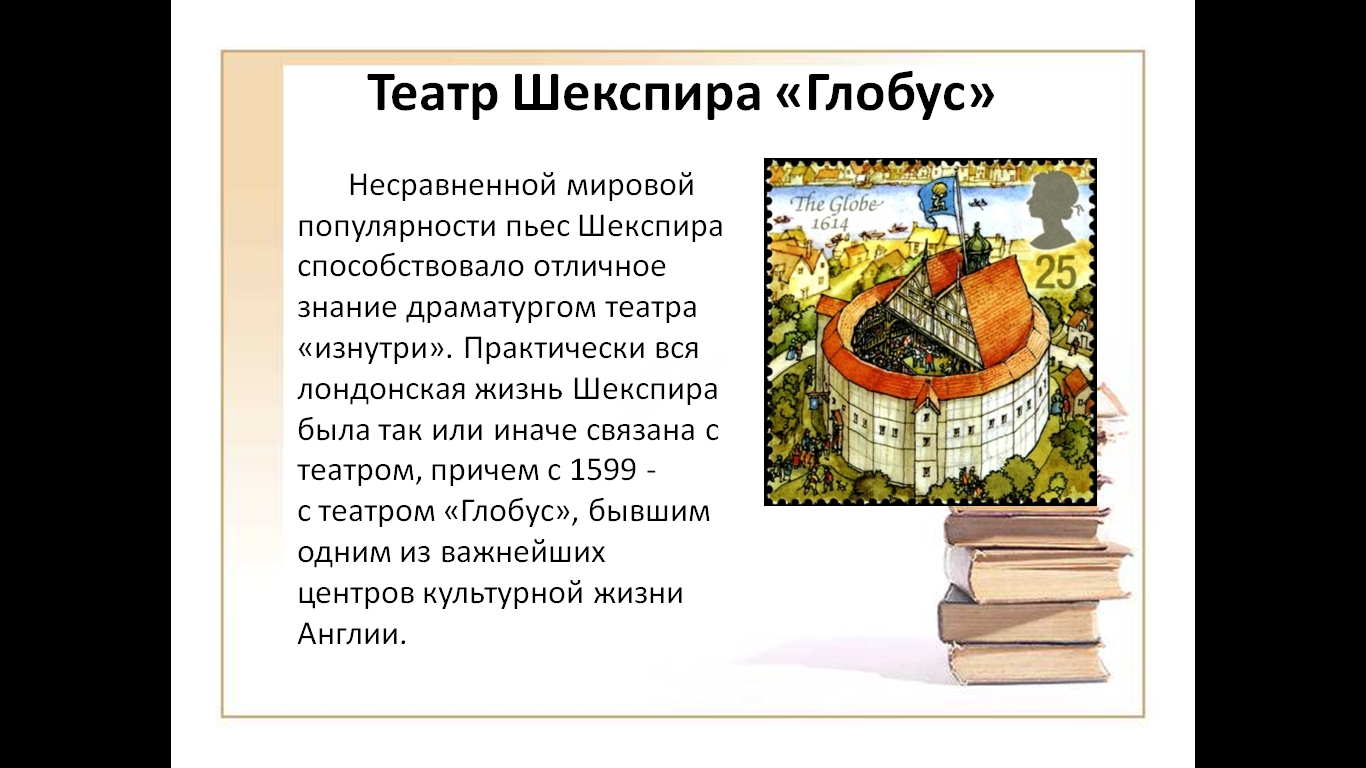
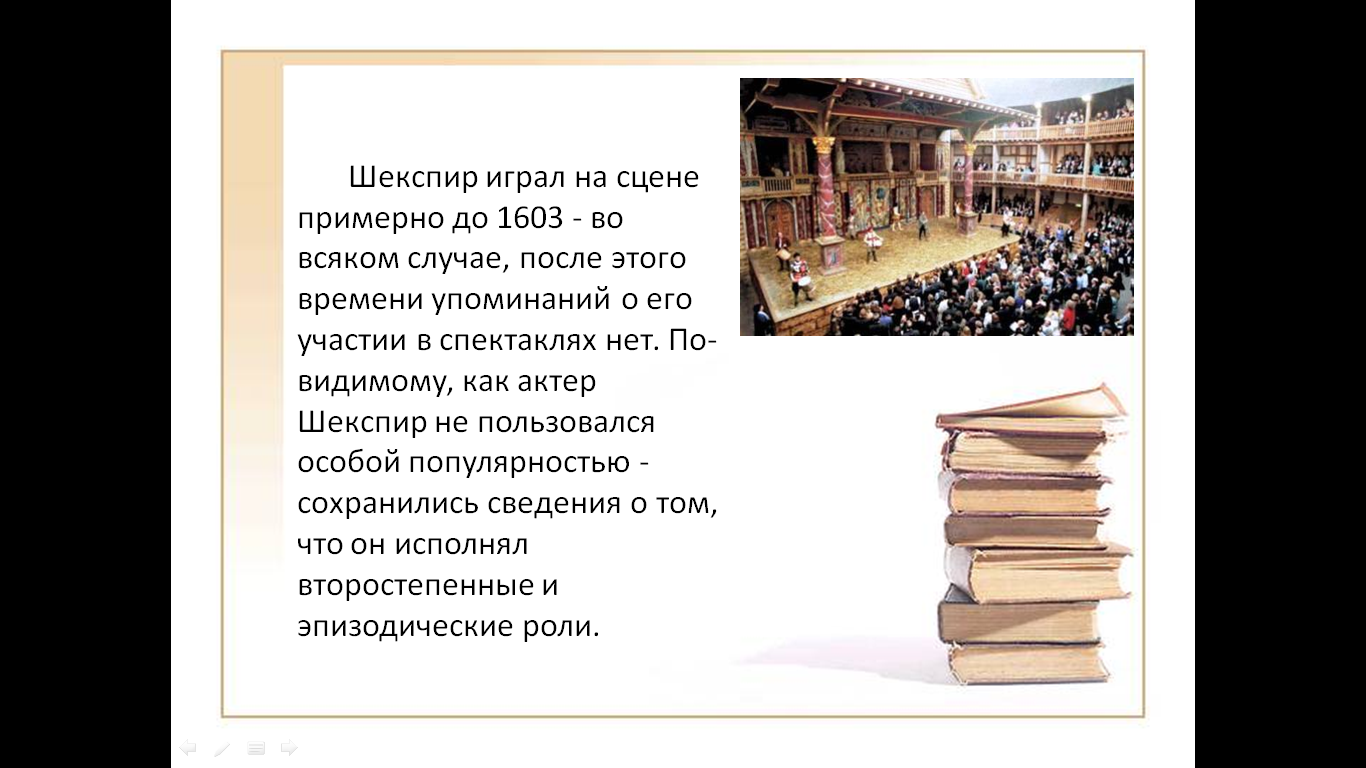
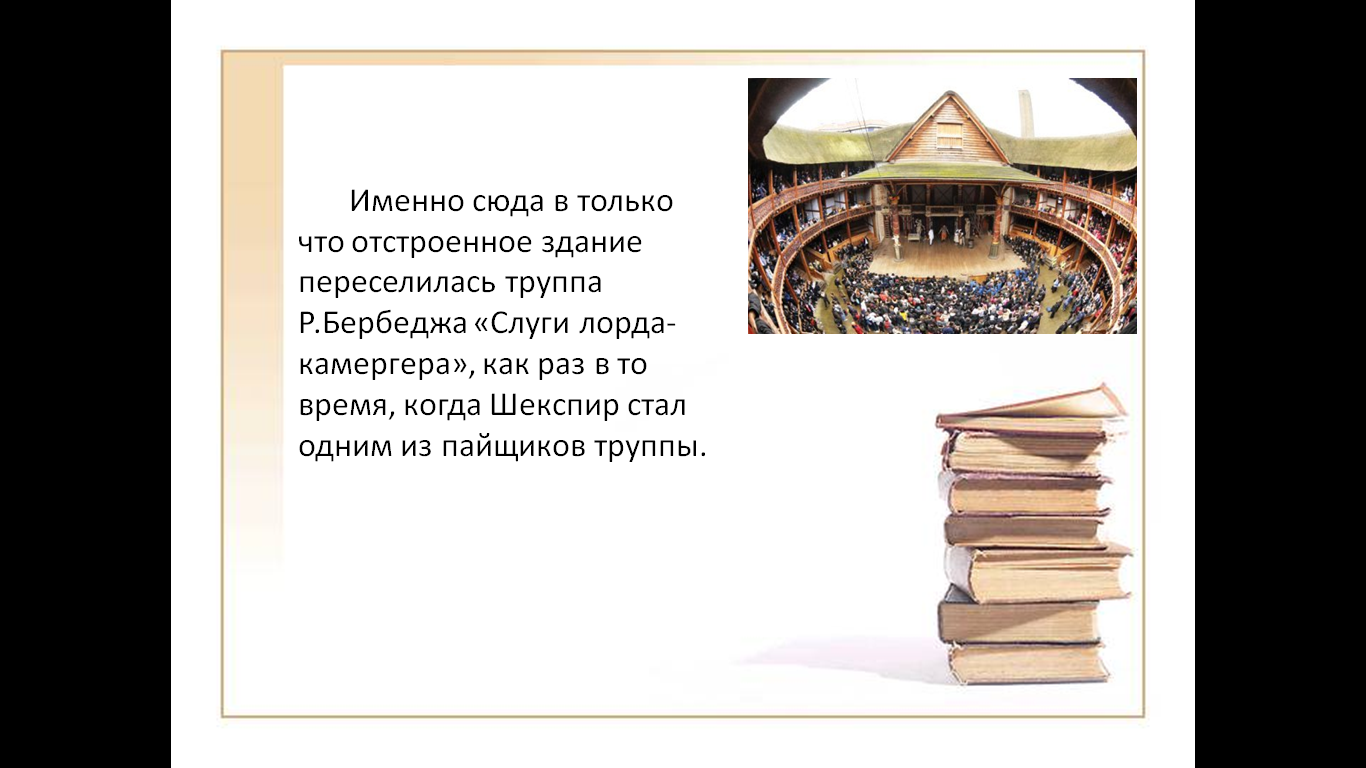
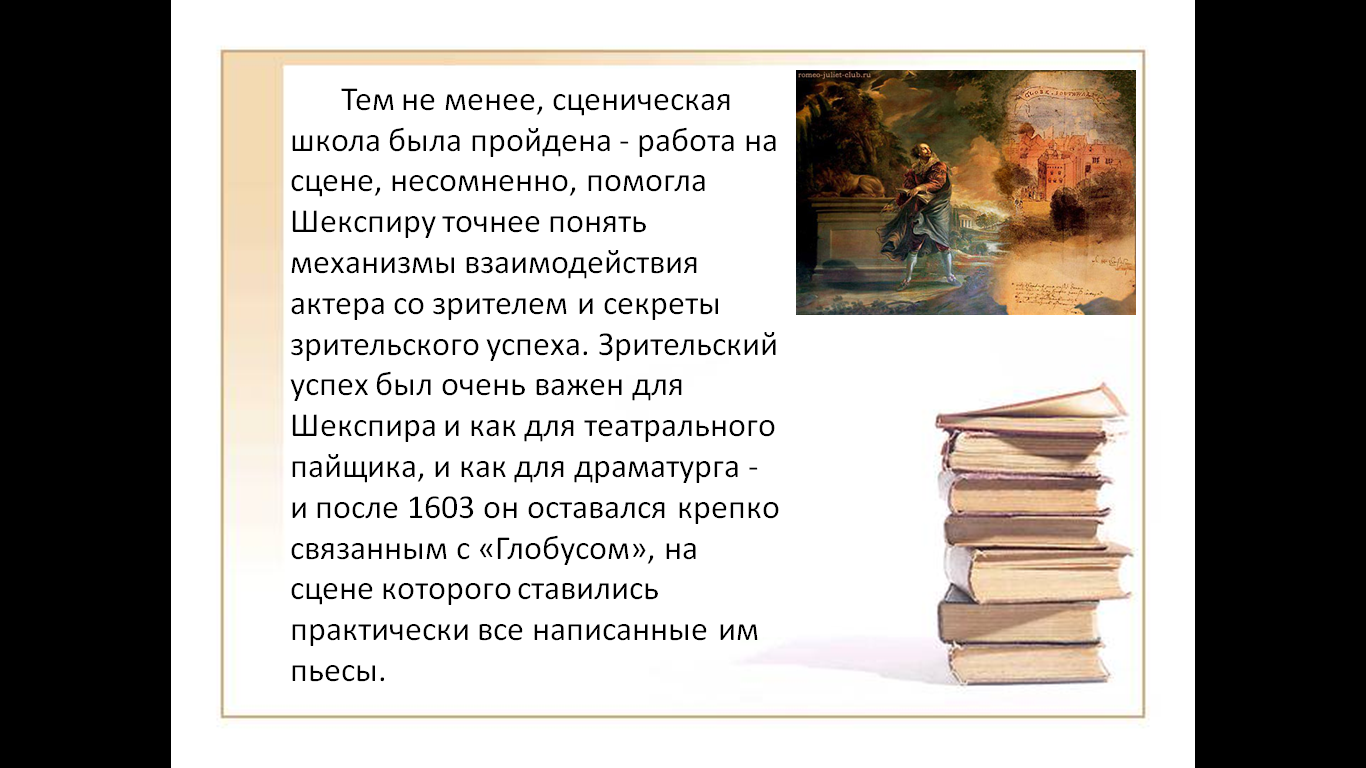
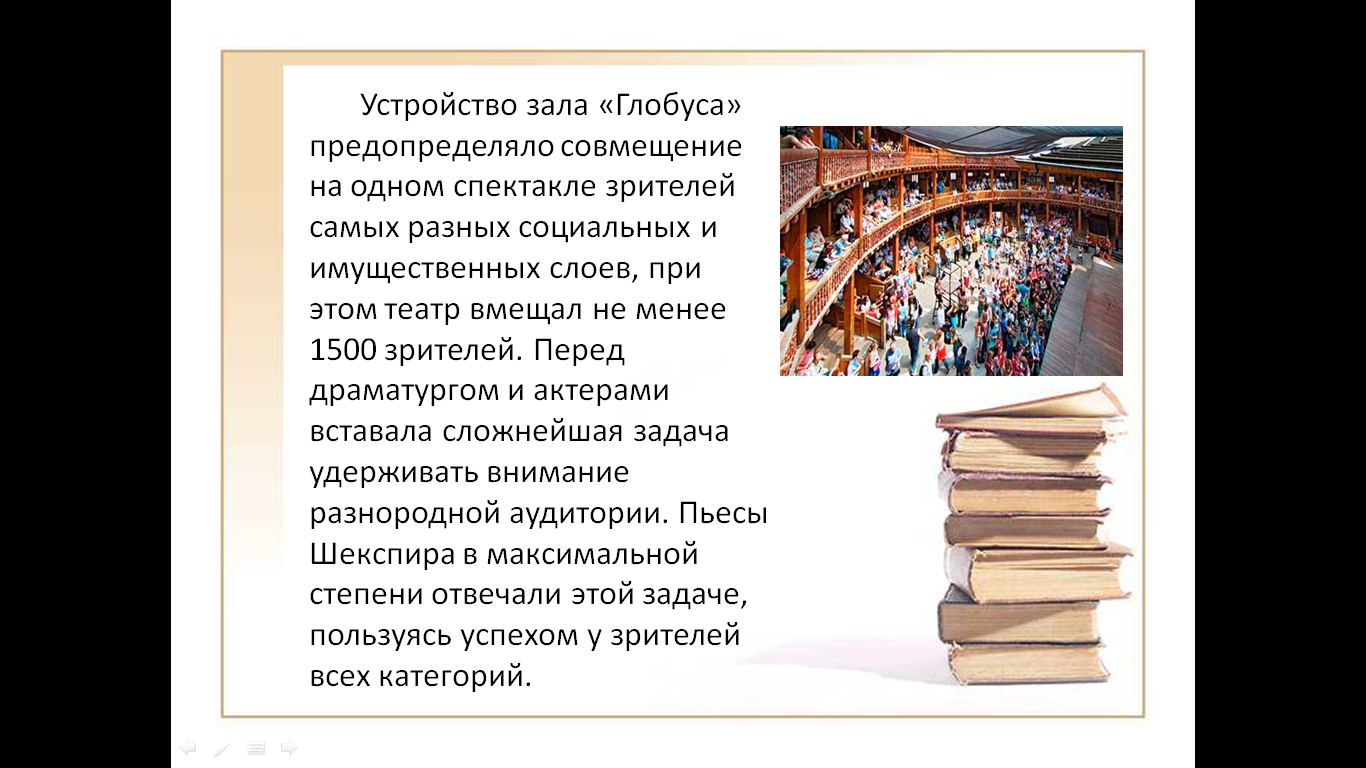
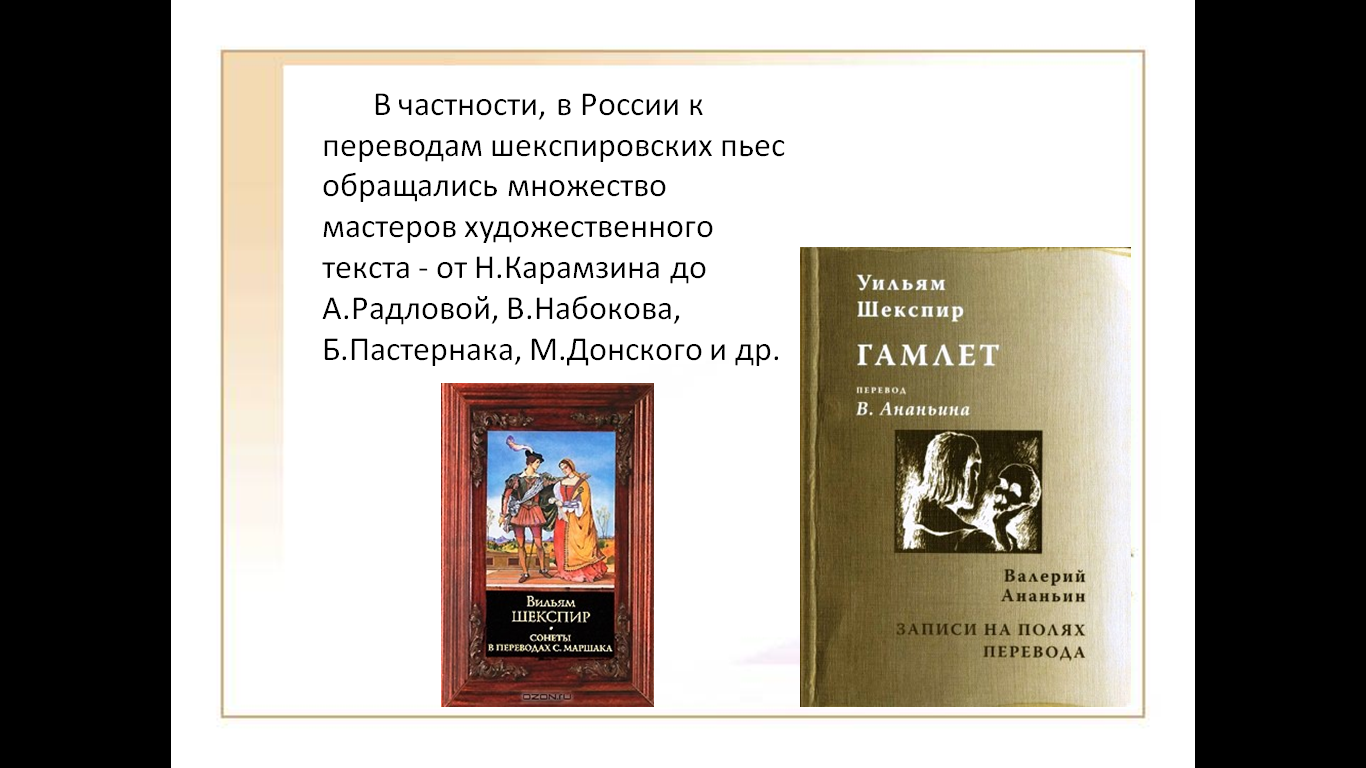
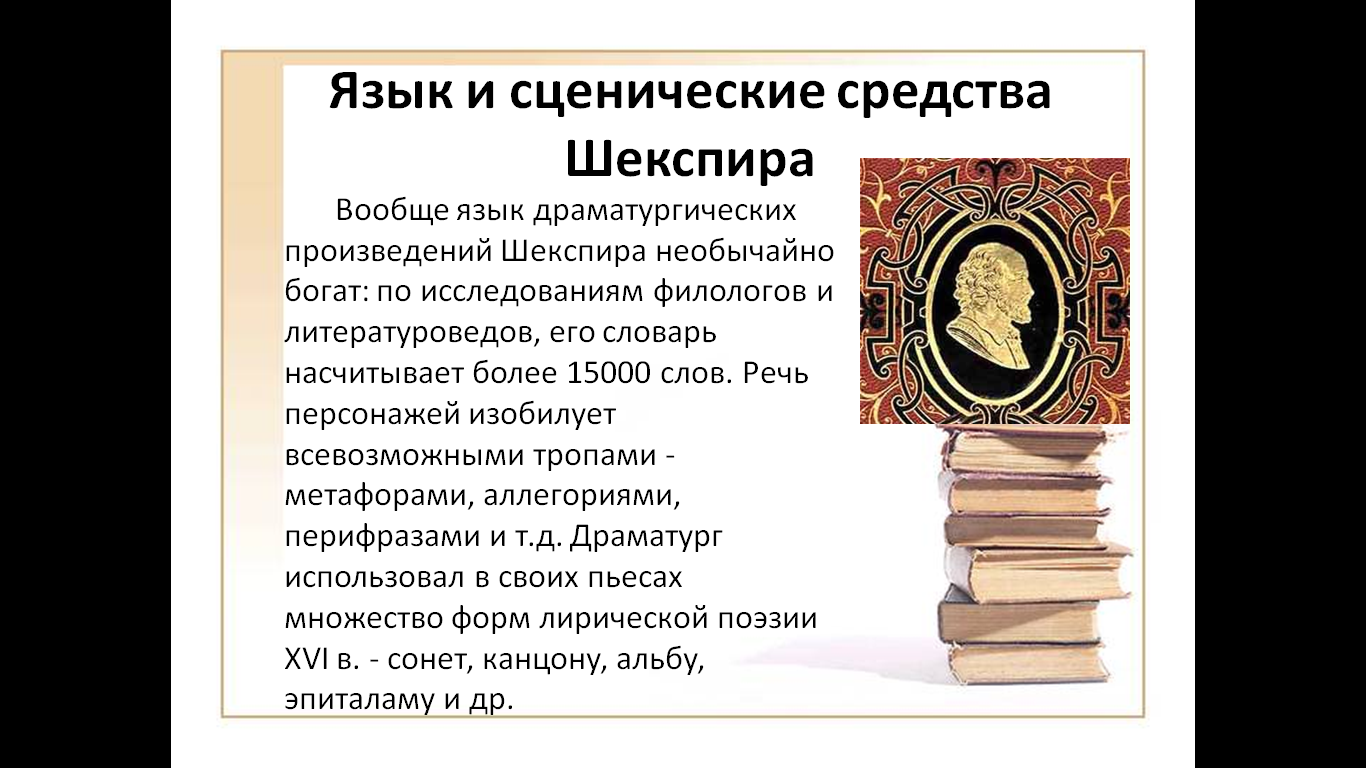
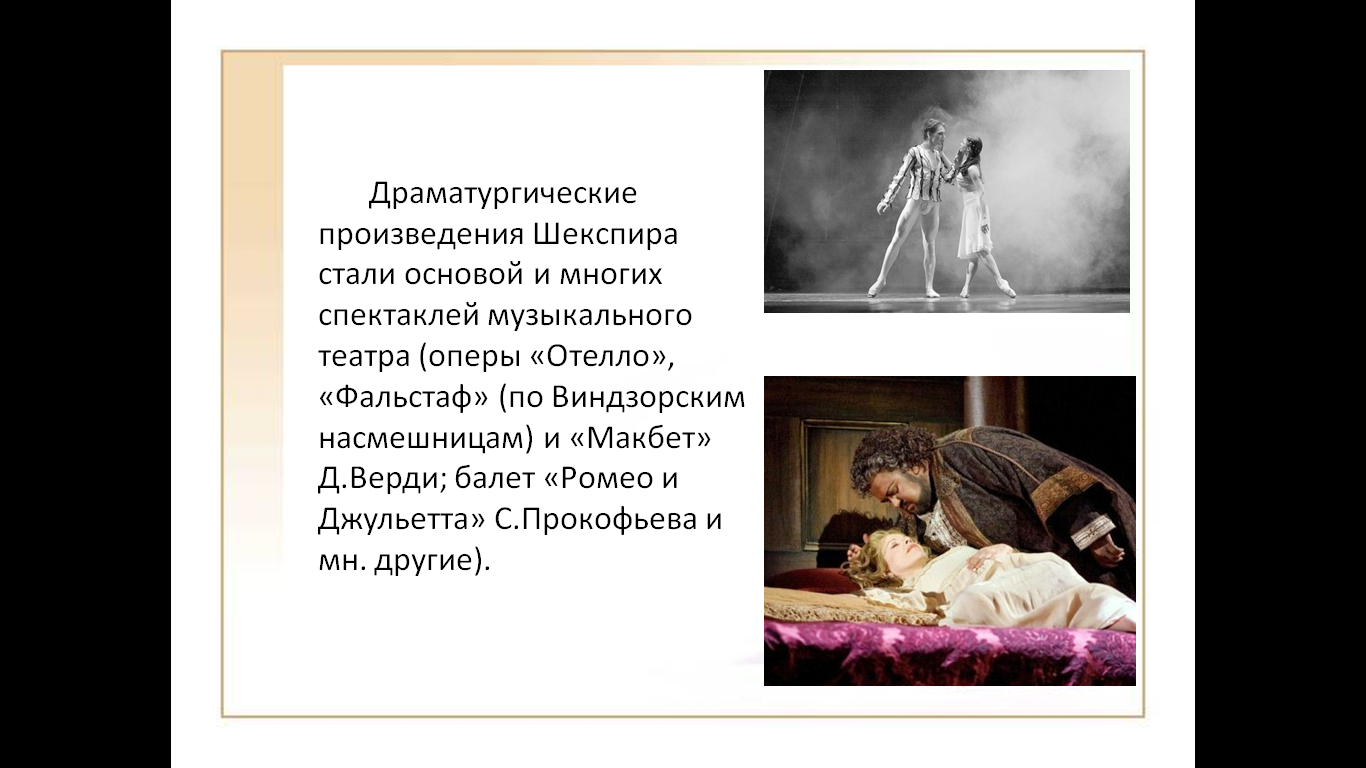
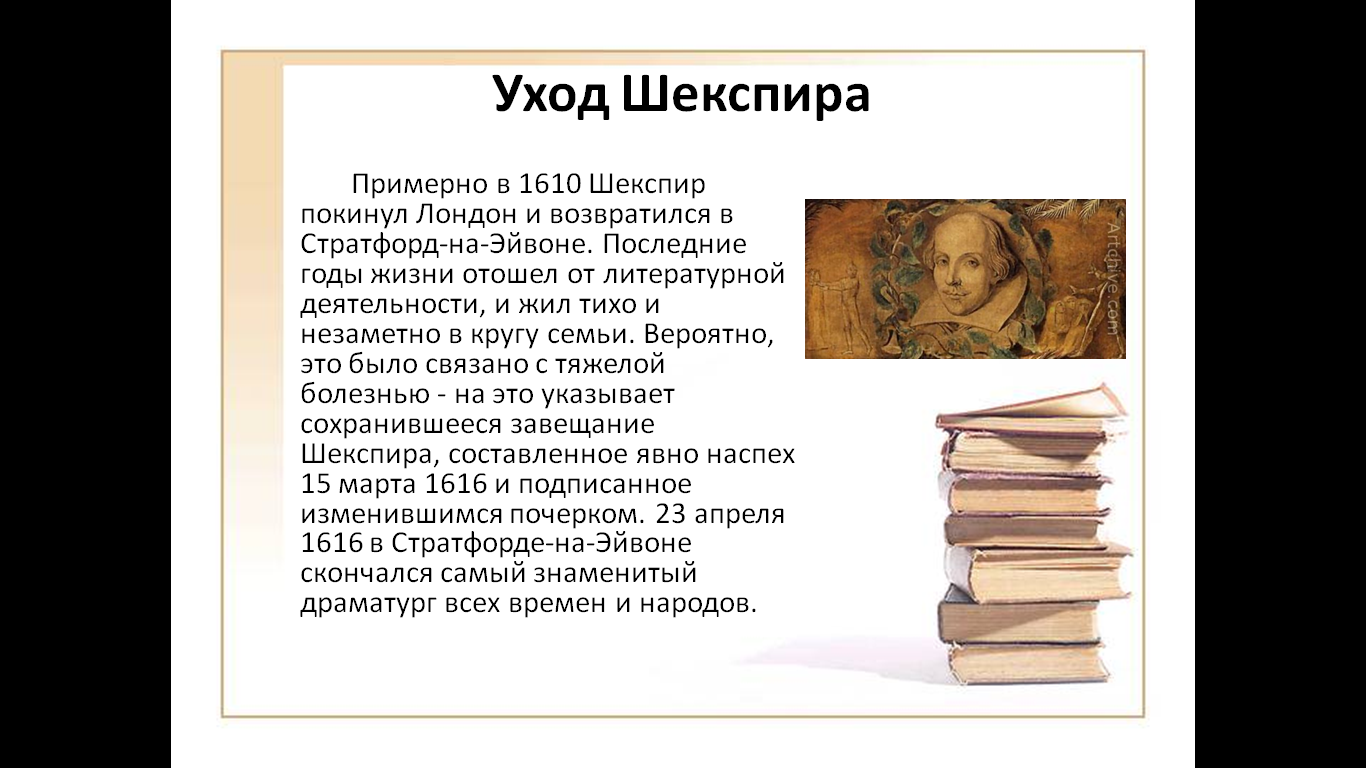
ВИКТОРИНА
A Shakespeare Biography Quiz
1. In what year was Shakespeare born?
-
1564
-
1616
-
1558
-
1592
2. What town or city was Shakespeare born in?
-
London
-
Stratford-upon-Avon
-
Snitterfield
-
Oxford
3. Shakespeare was born in Stratford-upon-Avon, but what county is the town in?
-
Sussex
-
Norfolk
-
Durham
-
Warwickshire
4. The names of Shakespeare's father and mother were:
-
Abraham and Sara
-
William and Anne
-
John and Mary
5. Shakespeare attended the Stratford Grammar School, also known as the King's New School:
-
From 1569 to 1579
-
He did not attend school.
-
There are no records of his school attendance, but it is highly likely he attended that school.
6. Who did Shakespeare marry?
-
Judith Sadler
-
Susanna Hall
-
Anne Hathaway
-
Mary Queen of Scots
7. How old was Shakespeare when he got married?
-
17
-
18
-
19
-
20
8. Shakespeare was the father of how many children?
-
3
-
2
-
10
-
1
9. Shakespeare left his home town of Stratford because:
-
He was caught poaching on the lands of Sir Thomas Lucy and fled to avoid prosecution.
-
He was apprenticed to his father who was a butcher. He hated the work and ran away to London.
-
He took a job as a school teacher in the country, and left to pursue this career.
-
It is not known for sure how or why he left.
10. The London theaters were closed on account of a virulent outbreak of the plague in 1593 and part of 1594. Specifically, what disease was this?
-
Tuberculosis
-
The Plague of Frogs
-
Bubonic Plague
-
The pox
11. In what year was the Globe Theater built?
-
1594
-
1599
-
1608
-
1613
12. Some time after 1599-1600 Shakespeare turned from writing predominantly romantic comedies and history plays to tragedies. Which five plays are known as his "great tragedies"?
-
Hamlet, Othello, Macbeth, King Lear, Antony and Cleopatra
-
The Merchant of Venice, Henry IV Part 1, Henry IV Part 2, Henry V, Twelfth Night
-
King John, Henry VI Part 1, Richard II, Richard III, Henry VIII
-
Measure for Measure, Troilus and Cressida, Coriolanus, Timon of Athens, Cymbeline.
13. In 1603 Shakespeare's acting company, The Lord Chamberlain's Men, became the King's Men. Which king was their patron?
-
George III
-
James I
-
Edward III
-
Henry VIII
14. In his later years, Shakespeare collaborated with what author on the play The Two Noble Kinsmen?
-
Thomas Middleton
-
Francis Beaumont.
-
Christopher Marlowe.
-
John Fletcher.
-
Ben Jonson
15. In what year did Shakespeare die?
-
1599
-
1616
-
1623
-
1642
16. How much did Shakespeare write?
-
1 play, 38 sonnets and 154 epic narrative poems
-
54 plays, 5 sonnets, and 38 epic narrative plays
-
4 plays, 38 sonnets, and 5 epic narrative poem
-
38 plays, 154 sonnets, and 2 epic narrative poems
17. In what year was the first collected edition of Shakespeare's plays, called the First Folio, published?
-
1599
-
1616
-
1623
-
1685
18. Is it reasonable to think that someone other than William Shakespeare (1564-1616) of Stratford-upon-Avon wrote the works attributed to him?
-
Yes.
-
No.
КЛЮЧИ
Keys to a Shakespeare Biography Quiz
-
A
-
B
-
D
-
C.
-
C
-
C
-
B
-
A
-
D
-
C
-
B
-
A
-
B
-
D
-
B
-
D
-
C
-
B
СТОИМОСТЬ ВОПРОСОВ ВИКТОРИНЫ
-
1
-
1
-
3
-
1
-
4
-
1
-
2
-
1
-
2
-
5
-
2
-
3
-
5
-
5
-
1
-
3
-
5
-
4
ВСЕГО: 49 БАЛЛОВ
БИОГРАФИЯ ШЕКСПИРА
William Shakespeare | Shakespeare Biography
Details about William Shakespeare's life are sketchy, mostly mere surmise based upon court or other clerical records. His parents, John and Mary (Arden), were married about 1557; she was of the landed gentry, he a yeoman-a glover and commodities merchant. By 1568, John had risen through the ranks of town government and held the position of high bailiff, similar to mayor. William, the eldest son, was born in 1564, probably on April 23, several days before his baptism on April 26, 1564. That Shakespeare also died on April 23, 52 years later, may have resulted in the adoption of this birthdate.
William no doubt attended the local grammar school in Stratford where his parents lived, and would have studied primarily Latin rhetoric, logic, and literature . At age 18 (1582), William married Anne Hathaway, a local farmer's daughter eight years his senior. Their first daughter (Susanna) was born six months later (1583), and twins Judith and Hamnet were born in 1585.
Shakespeare's life can be divided into three periods: the first 20 years in Stratford, which include his schooling, early marriage, and fatherhood; the next 25 years as an actor and playwright in London; and the last five in retirement back in Stratford where he enjoyed moderate wealth gained from his theatrical successes. The years linking the first two periods are marked by a lack of information about Shakespeare, and are often referred to as the "dark years"; the transition from active work into retirement was gradual and cannot be precisely dated [Boyce, 587].
John Shakespeare had suffered financial reverses from William's teen years until well into the height of the playwright's popularity and success. In 1596, John Shakespeare was granted a coat of arms, almost certainly purchased by William, who the next year bought a sizable house in Stratford. By the time of his death, William had substantial properties, both professional and personal, which he bestowed on his theatrical associates and his family (primarily his daughter Susanna, having rewritten his will one month before his death to protect his assets from Judith's new husband, Thomas Quiney, who ran afoul of church doctrine and public esteem before and after the marriage) [Boyce, 529].
Shakespeare probably left school at 15, which was the norm, and took some sort of job, especially since this was the period of his father's financial difficulty. Numerous references in his plays suggest that William may have in fact worked for his father, thereby gaining specialized knowledge [Boyce, 587].
At some point during the "dark years," Shakespeare began his career with a London theatrical company-perhaps in 1589-for he was already an actor and playwright of some note in 1592. Shakespeare apparently wrote and acted for Pembroke's Men, as well as numerous others, in particular Strange's Men, which later became the Chamberlain's Men, with whom he remained for the rest of his career.
When, in 1592, the Plague closed the theaters for about two years, Shakespeare turned to writing book-length narrative poetry. Most notable were "Venus and Adonis" and "The Rape of Lucrece," both of which were dedicated to the Earl of Southampton, whom scholars accept as Shakespeare's friend and benefactor despite a lack of documentation.
During this same period, Shakespeare was writing his sonnets, which are more likely signs of the time's fashion rather than actual love poems detailing any particular relationship. He returned to play writing when theaters reopened in 1594, and published no more poetry. His sonnets were published without his consent in 1609, shortly before his retirement.
Amid all of his success, Shakespeare suffered the loss of his only son, Hamnet, who died in 1596 at the age of 11. But Shakespeare's career continued unabated, and in London in 1599, he became one of the partners in the new Globe Theater, built by the Chamberlain's Men. This group was a remarkable assemblage of "excellent actors who were also business partners and close personal friends . . . [including] Richard Burbage . . . [who] all worked together as equals . . . ".
When Queen Elizabeth died in 1603 and was succeeded by her cousin King James of Scotland, the Chamberlain's Men was renamed the King's Men, and Shakespeare's productivity and popularity continued uninterrupted. He invested in London real estate and, one year away from retirement, purchased a second theater, the Blackfriars Gatehouse, in partnership with his fellow actors. His final play was Henry VIII, two years before his death in 1616.
Incredibly, most of Shakespeare's plays had never been published in anything except pamphlet form, and were simply extant as acting scripts stored at the Globe. Only the efforts of two of Shakespeare's company, John Heminges and Henry Condell, preserved his 36 plays (minus Pericles, the thirty-seventh) in the First Folio. Heminges and Condell published the plays, they said, "only to keep the memory of so worthy a friend and fellow alive as was our Shakespeare" . Theater scripts were not regarded as literary works of art, but only the basis for the performance. Plays were a popular form of entertainment for all layers of society in Shakespeare's time, which perhaps explains why Hamlet feels compelled to instruct the traveling Players on the fine points of acting, urging them not "to split the ears of the groundlings," nor "speak no more than is set down for them."
Present copies of Shakespeare's plays have, in some cases, been reconstructed in part from scripts written down by various members of an acting company who performed particular roles. Shakespeare's plays, like those of many of the actors who also were playwrights, belonged to the acting company. The performance, rather than the script, was what concerned the author, for that was how his play would become popular-and how the company, in which many actors were shareholders, would make money.
William Shakespeare died on April 23, 1616, and was buried two days later in the chancel of Holy Trinity Church where he had been baptized exactly 52 years earlier.
КЛАССИФИКАЦИЯ ПРОИЗВЕДЕНИЙ ШЕКСПИРА
Classification the Plays of William Shakespeare
By Sir John Gilbert, 1849
Shakespeare's works include the 36 plays printed in the First Folio of 1623, listed below according to their folio classification as comedies, histories and tragedies. Two plays not included in the First Folio, The Two Noble Kinsmen and Pericles, Prince of Tyre, are now accepted as part of the canon, with scholars agreed that Shakespeare made a major contribution to their composition. [185] No poems were included in the First Folio.
In the late nineteenth century, Edward Dowden classified four of the late comedies as romances, and though many scholars prefer to call them tragicomedies, his term is often used. These plays and the associated Two Noble Kinsmen are marked with an asterisk (*) below. In 1896, Frederick S. Boas coined the term "problem plays" to describe four plays: All's Well That Ends Well, Measure for Measure, Troilus and Cressida and Hamlet. "Dramas as singular in theme and temper cannot be strictly called comedies or tragedies", he wrote. "We may therefore borrow a convenient phrase from the theatre of today and class them together as Shakespeare's problem plays." The term, much debated and sometimes applied to other plays, remains in use, though Hamlet is definitively classed as a tragedy. The other problem plays are marked below with a double dagger (‡).Plays thought to be only partly written by Shakespeare are marked with a dagger (†) below. Other works occasionally attributed to him are listed as apocrypha.Comedies
-
All's Well That Ends Well‡
-
As You Like It
-
The Comedy of Errors
-
Love's Labour's Lost
-
Measure for Measure‡
-
The Merchant of Venice
-
The Merry Wives of Windsor
-
A Midsummer Night's Dream
-
Much Ado About Nothing
-
Pericles, Prince of Tyre*†
-
The Taming of the Shrew
-
The Tempest*
-
Twelfth Night
-
The Two Gentlemen of Verona
-
The Two Noble Kinsmen*†
-
The Winter's Tale*
Histories
-
King John
-
Richard II
-
Henry IV, part 1
-
Henry IV, part 2
-
Henry V
-
Henry VI, part 1†
-
Henry VI, part 2
-
Henry VI, part 3
-
Richard III
-
Henry VIII†
Tragedies
-
Romeo and Juliet
-
Coriolanus
-
Titus Andronicus†
-
Timon of Athens†
-
Julius Caesar
-
Macbeth†
-
Hamlet
-
Troilus and Cressida‡
-
King Lear
-
Othello
-
Antony and Cleopatra
-
Cymbeline</*